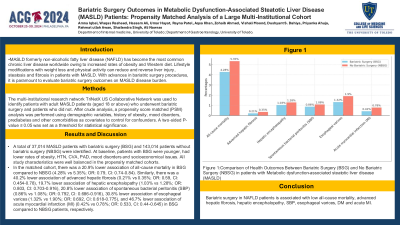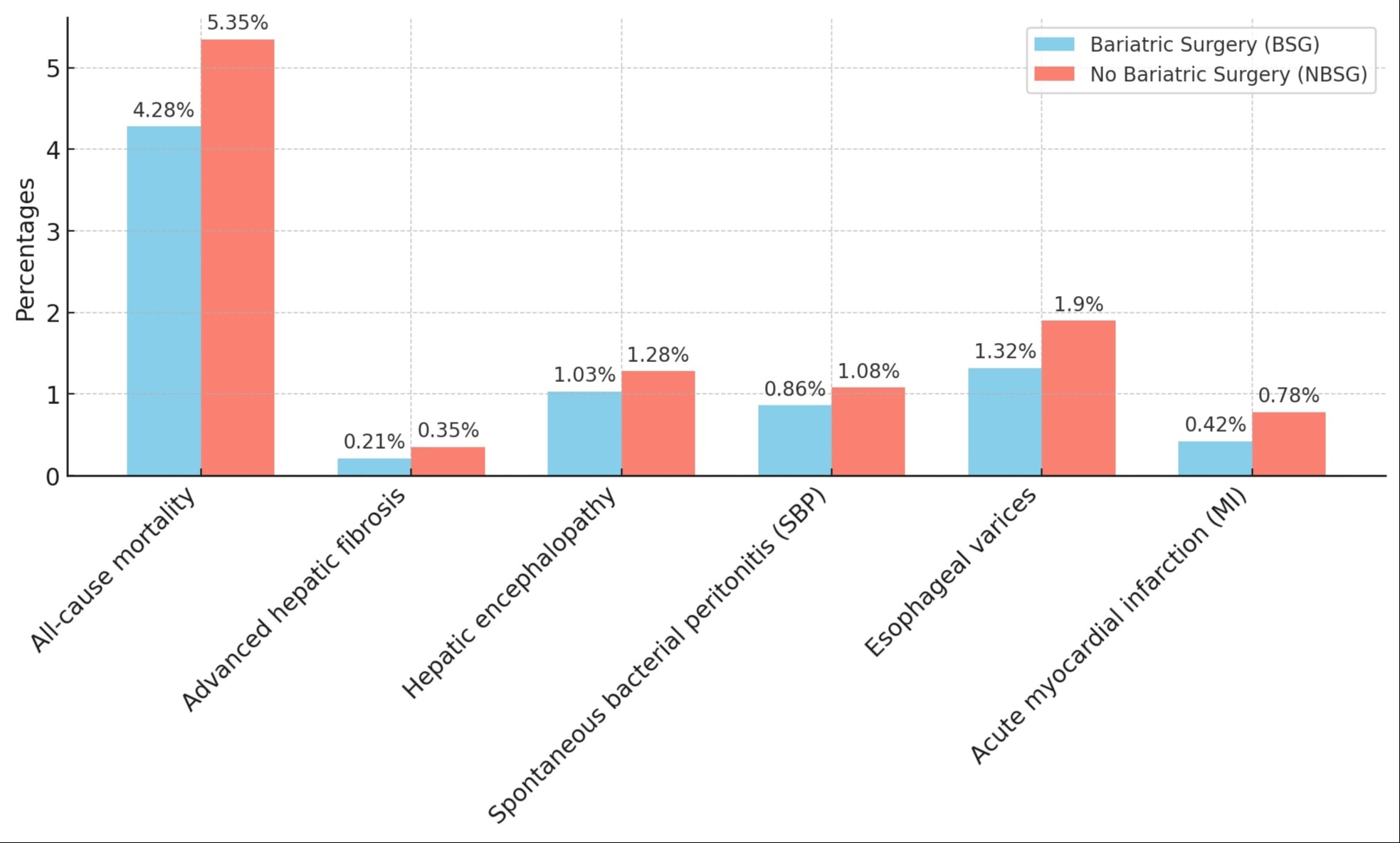Tuesday Poster Session
Category: Liver
P4600 - Bariatric Surgery Outcomes in Metabolic Dysfunction-Associated Steatotic Liver Disease (MASLD) Patients: Propensity Matched Analysis of a Large Multi-Institutional Cohort
Tuesday, October 29, 2024
10:30 AM - 4:00 PM ET
Location: Exhibit Hall E


Amna Iqbal, MD
University of Toledo Medical Center
Toledo, OH
Presenting Author(s)
Amna Iqbal, MD1, Waqas Rasheed, MD2, Hassam Ali, MD3, Umar Hayat, MD4, Rayna Patel, MD1, Aqsa Khan, MD5, Zohaib Ahmed, MD1, Vishali Moond, MD6, Dushyant S. Dahiya, MD7, Priyanka Ahuja, MD8, Rehmat Ullah Awan, MD9, Shailendra Singh, MD9, Ali Nawras, MD1
1University of Toledo Medical Center, Toledo, OH; 2University of Kentucky, Lexington, KY; 3ECU Health Medical Center, Greenville, NC; 4Geisinger Wyoming Valley Medical Center, Wilkes-Barre, PA; 5Parkview Health Center, Fort Wayne, IN; 6Saint Peter's University Hospital, New Brunswick, NJ; 7The University of Kansas School of Medicine, Kansas City, KS; 8University of Toledo, Toledo, OH; 9West Virginia University, Morgantown, WV
Introduction: Metabolic dysfunction-associated steatotic liver disease (MASLD) formerly non-alcoholic fatty liver disease (NAFLD), has become the most common chronic liver disease worldwide owing to increased rates of obesity and Western diet. Lifestyle modifications with weight loss and physical activity can reduce and reverse liver injury in patients with MASLD. With advances in bariatric surgery procedures, it is paramount to evaluate bariatric surgery outcomes on MASLD disease burden.
Methods: The multi-institutional research network TriNetX US Collaborative Network was used to identify patients with adult MASLD patients (aged 18 or above) who underwent bariatric surgery and patients who did not. After crude analysis, a propensity score matched (PSM) analysis was performed using demographic variables, history of obesity, mood disorders, prediabetes and other comorbidities as covariates to control for confounders. A two-sided P-value ≤ 0.05 was set as a threshold for statistical significance.
Results: A total of 37,014 MASLD patients with bariatric surgery (BSG) and 143,014 patients without bariatric surgery (NBSG) were identified. . At baseline, patients with BSG were younger, had lower rates of obesity, HTN, CVA, PAD, mood disorders and socioeconomical issues (Table 1). All study characteristics were well balanced in the propensity matched cohorts (Table 1).
In the matched cohort, there was a 20.9% lower association of all-cause mortality in BSG compared to NBSG (4.28% vs 5.35%; OR: 0.79, CI: 0.74-0.84). Similarly, there was a 40.2% lower association of advanced hepatic fibrosis (0.21% vs 0.35%; OR: 0.59, CI: 0.454-0.78), 19.7% lower association of hepatic encephalopathy (1.03% vs 1.28%; OR: 0.803, CI: 0.703-0.916), 20.8% lower association of spontaneous bacterial peritonitis (SBP) (0.86% vs 1.08%; OR: 0.792, CI: 0.686-0.916), 30.8% lower association of esophageal varices (1.32% vs 1.90%; OR: 0.692, CI: 0.618-0.775), and 46.7% lower association of acute myocardial infarction (MI) (0.42% vs 0.78%; OR: 0.533, CI: 0.44-0.645) in BSG compared to NBSG patients, respectively.
Discussion: Bariatric surgery in NAFLD patients is associated with low all-cause mortality, advanced hepatic fibrosis, hepatic encephalopathy, SBP, esophageal varices, DM and acute MI.

Note: The table for this abstract can be viewed in the ePoster Gallery section of the ACG 2024 ePoster Site or in The American Journal of Gastroenterology's abstract supplement issue, both of which will be available starting October 27, 2024.
Disclosures:
Amna Iqbal, MD1, Waqas Rasheed, MD2, Hassam Ali, MD3, Umar Hayat, MD4, Rayna Patel, MD1, Aqsa Khan, MD5, Zohaib Ahmed, MD1, Vishali Moond, MD6, Dushyant S. Dahiya, MD7, Priyanka Ahuja, MD8, Rehmat Ullah Awan, MD9, Shailendra Singh, MD9, Ali Nawras, MD1. P4600 - Bariatric Surgery Outcomes in Metabolic Dysfunction-Associated Steatotic Liver Disease (MASLD) Patients: Propensity Matched Analysis of a Large Multi-Institutional Cohort, ACG 2024 Annual Scientific Meeting Abstracts. Philadelphia, PA: American College of Gastroenterology.
1University of Toledo Medical Center, Toledo, OH; 2University of Kentucky, Lexington, KY; 3ECU Health Medical Center, Greenville, NC; 4Geisinger Wyoming Valley Medical Center, Wilkes-Barre, PA; 5Parkview Health Center, Fort Wayne, IN; 6Saint Peter's University Hospital, New Brunswick, NJ; 7The University of Kansas School of Medicine, Kansas City, KS; 8University of Toledo, Toledo, OH; 9West Virginia University, Morgantown, WV
Introduction: Metabolic dysfunction-associated steatotic liver disease (MASLD) formerly non-alcoholic fatty liver disease (NAFLD), has become the most common chronic liver disease worldwide owing to increased rates of obesity and Western diet. Lifestyle modifications with weight loss and physical activity can reduce and reverse liver injury in patients with MASLD. With advances in bariatric surgery procedures, it is paramount to evaluate bariatric surgery outcomes on MASLD disease burden.
Methods: The multi-institutional research network TriNetX US Collaborative Network was used to identify patients with adult MASLD patients (aged 18 or above) who underwent bariatric surgery and patients who did not. After crude analysis, a propensity score matched (PSM) analysis was performed using demographic variables, history of obesity, mood disorders, prediabetes and other comorbidities as covariates to control for confounders. A two-sided P-value ≤ 0.05 was set as a threshold for statistical significance.
Results: A total of 37,014 MASLD patients with bariatric surgery (BSG) and 143,014 patients without bariatric surgery (NBSG) were identified. . At baseline, patients with BSG were younger, had lower rates of obesity, HTN, CVA, PAD, mood disorders and socioeconomical issues (Table 1). All study characteristics were well balanced in the propensity matched cohorts (Table 1).
In the matched cohort, there was a 20.9% lower association of all-cause mortality in BSG compared to NBSG (4.28% vs 5.35%; OR: 0.79, CI: 0.74-0.84). Similarly, there was a 40.2% lower association of advanced hepatic fibrosis (0.21% vs 0.35%; OR: 0.59, CI: 0.454-0.78), 19.7% lower association of hepatic encephalopathy (1.03% vs 1.28%; OR: 0.803, CI: 0.703-0.916), 20.8% lower association of spontaneous bacterial peritonitis (SBP) (0.86% vs 1.08%; OR: 0.792, CI: 0.686-0.916), 30.8% lower association of esophageal varices (1.32% vs 1.90%; OR: 0.692, CI: 0.618-0.775), and 46.7% lower association of acute myocardial infarction (MI) (0.42% vs 0.78%; OR: 0.533, CI: 0.44-0.645) in BSG compared to NBSG patients, respectively.
Discussion: Bariatric surgery in NAFLD patients is associated with low all-cause mortality, advanced hepatic fibrosis, hepatic encephalopathy, SBP, esophageal varices, DM and acute MI.

Figure: Figure 1: Comparison of Health Outcomes Between Bariatric Surgery (BSG) and No Bariatric Surgery (NBSG) in patients with Metabolic dysfunction-associated steatotic liver disease (MASLD)
Note: The table for this abstract can be viewed in the ePoster Gallery section of the ACG 2024 ePoster Site or in The American Journal of Gastroenterology's abstract supplement issue, both of which will be available starting October 27, 2024.
Disclosures:
Amna Iqbal indicated no relevant financial relationships.
Waqas Rasheed indicated no relevant financial relationships.
Hassam Ali indicated no relevant financial relationships.
Umar Hayat indicated no relevant financial relationships.
Rayna Patel indicated no relevant financial relationships.
Aqsa Khan indicated no relevant financial relationships.
Zohaib Ahmed indicated no relevant financial relationships.
Vishali Moond indicated no relevant financial relationships.
Dushyant Dahiya indicated no relevant financial relationships.
Priyanka Ahuja indicated no relevant financial relationships.
Rehmat Ullah Awan indicated no relevant financial relationships.
Shailendra Singh: Apollo Endosurgery – Consultant. Boston Scientific – Consultant. Fujifilm Endoscopy – Consultant.
Ali Nawras indicated no relevant financial relationships.
Amna Iqbal, MD1, Waqas Rasheed, MD2, Hassam Ali, MD3, Umar Hayat, MD4, Rayna Patel, MD1, Aqsa Khan, MD5, Zohaib Ahmed, MD1, Vishali Moond, MD6, Dushyant S. Dahiya, MD7, Priyanka Ahuja, MD8, Rehmat Ullah Awan, MD9, Shailendra Singh, MD9, Ali Nawras, MD1. P4600 - Bariatric Surgery Outcomes in Metabolic Dysfunction-Associated Steatotic Liver Disease (MASLD) Patients: Propensity Matched Analysis of a Large Multi-Institutional Cohort, ACG 2024 Annual Scientific Meeting Abstracts. Philadelphia, PA: American College of Gastroenterology.
